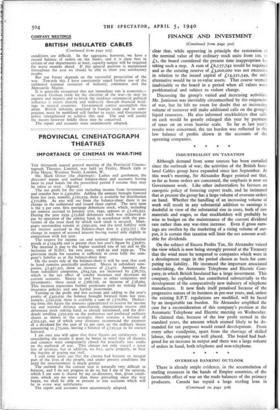INDUSTRIALIST ON TAXATION
Although demand from some sources has been curtailed since the outbreak of war, the activities of the British Insu- lated Cables group have expanded since last September. At this week's meeting, Sir Alexander Roger pointed out that, so far as home orders are concerned, the emphasis is now on Government work. Like other industrialists he favours an energetic policy of fostering export trade, and he intimated that at present the group has a large volume of overseas orders on hand. Whether the handling of an increasing volume of work will result in any substantial addition to earnings is doubtful in view of the substantial rise in costs, both of raw materials and wages, so that stockholders will probably be wise to budget on the maintenance of the current dividend rate rather than any war-time increase. Even if gross earn- ings are swollen by the marketing of a rising volume of out- put, it is certain that taxation will limit the net amount avail- able for dividends.
On the subject of Excess Profits Tax, Sir Alexander voiced the view which is now being strongly pressed at the Treasury that the wind must be tempered to companies which were in a development stage in the period chosen as basis for com- puting tax liability. He instanced the important associated undertaking, the Automatic Telephone and Electric Com- pany, in which British Insulated has a large investment. This company, he explained, has contributed substantially to the development of the comparatively new industry of telephone manufacture. It now finds itself penalised because of the progressive nature of its business in pre-war years, and, unless the existing E.P.T. regulations are modified, will be faced by an inequitable tax burden. Sir Alexander amplified the case for a reconsideration of this company's position at the Automatic Telephone and Electric meeting on Wednesday. He claimed that, because of the low profit earned in the standard years, the amount which seemed likely to be de- manded for tax purposes would retard development. From every other standpoint, apart from the shortage of skilled labour, the company was well placed. The board had bud- geted for an increase in output and there was a large volume of orders in hand, both telephone and non-telephone.
* * * *














































 Previous page
Previous page